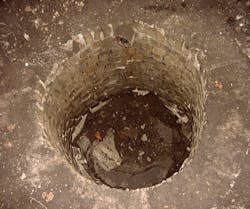EPA requires closures of 19 illegal cesspools in Hawaii in 2017
HONOLULU, JAN 29, 2018 -- The U.S. Environmental Protection Agency's enforcement actions in 2017 in Hawaii resulted in closures of 19 large capacity cesspools (LCC) and over $500,000 in fines.
EPA regulations under the Safe Drinking Water Act required closure of all existing LCCs by April 5, 2005. The ban does not apply to individual cesspools connected to single-family homes.
"We will continue working to close all remaining large cesspools," said Alexis Strauss, EPA's Acting Regional Administrator for the Pacific Southwest. "This enforcement effort will help protect Hawaii's drinking water and coastal water resources."
Cesspools collect and discharge untreated raw sewage into the ground, where disease-causing pathogens and harmful chemicals can contaminate groundwater, streams and the ocean. Groundwater provides 99 percent of all domestic water in Hawaii, where cesspools are used more widely than in any other state. Since EPA banned LCCs in 2005, over 3,400 large-capacity cesspools have been closed state-wide, many through voluntary compliance.
EPA actions to close prohibited LCCs in the past year include:
• Matheson Tri-Gas facility, a commercial gas supply company in Campbell Industrial Park, Kapolei, Oahu closed two LCCs and converted to a septic system. The company agreed to pay a civil penalty of $88,374 and to spend an estimated $50,000 on a supplemental environmental project to close an on-site small-capacity cesspool. Matheson completed its work and converted to a septic system at the end of 2017.
• Maui Varieties Investments, Inc., which owns two Big Island hardware stores and a commercial property, is closing four LCCs at its properties in Naalehu, Kamuela and Hilo and paid a $134,000 penalty.
• Fileminders of Hawaii, LLC, which operated a prohibited cesspool in Kapolei, and Hawaii MMGD, the company's owner, were assessed a civil penalty of $122,000. In June, the cesspool was closed and the company installed an individual wastewater system.
• The U.S. Navy paid a civil penalty of $94,200 and closed nine LCCs at Joint Base Pearl Harbor-Hickam. The Navy had closed six cesspools in 2012, but had failed to close the remaining three in a timely manner. The three remaining cesspools served an estimated 160 people at three separate facilities. The Navy has since closed the non-compliant cesspools.
• The County of Hawaii agreed to close seven large capacity cesspools that serve the Pahala and Naalehu communities. The agreement requires the closure of two LCCs serving the Pahala community, three LCCs serving the Naalehu community, and two LCCs serving the Pahala Elderly Apartments. Combined, the seven cesspools serve about 280 households. The County will replace the cesspools with wastewater treatment systems approved by the Hawaii Department of Health.
• Aloha Petroleum, Ltd. paid a penalty of $57,500 for operation of an LCC at its Aloha Island Mart convenience store and gas station in Captain Cook on the Big Island. EPA found that Aloha Island Mart had operated the illegal LCC until 2014. Aloha Petroleum has since closed the non-compliant cesspool and replaced it with an approved wastewater system.
• Uilani Associates owns and operates the Uilani Plaza, a multi-unit commercial building in Kamuela. The company paid a $6,000 fine and replaced the cesspool with a Hawaii Department of Health approved wastewater system.
